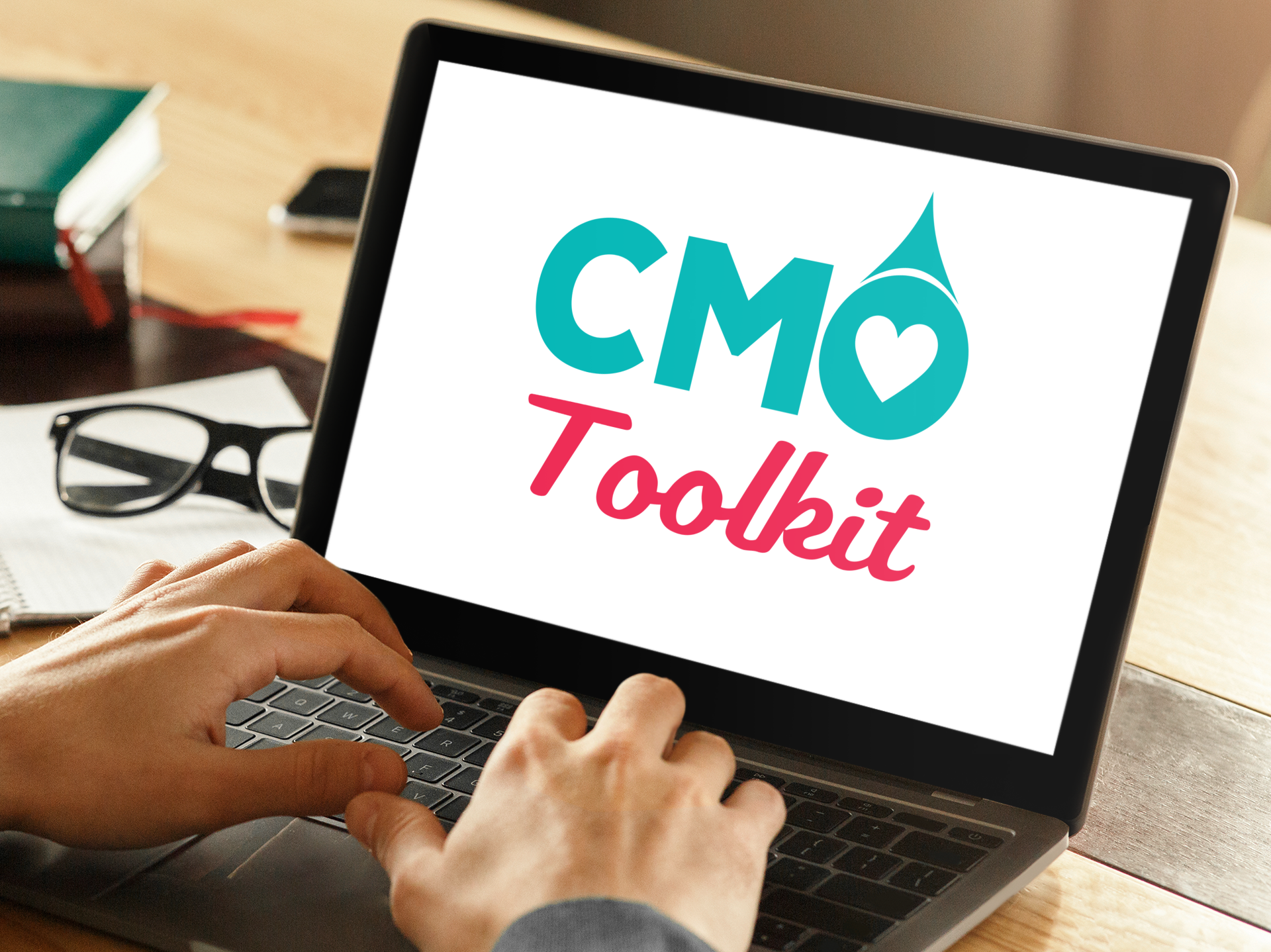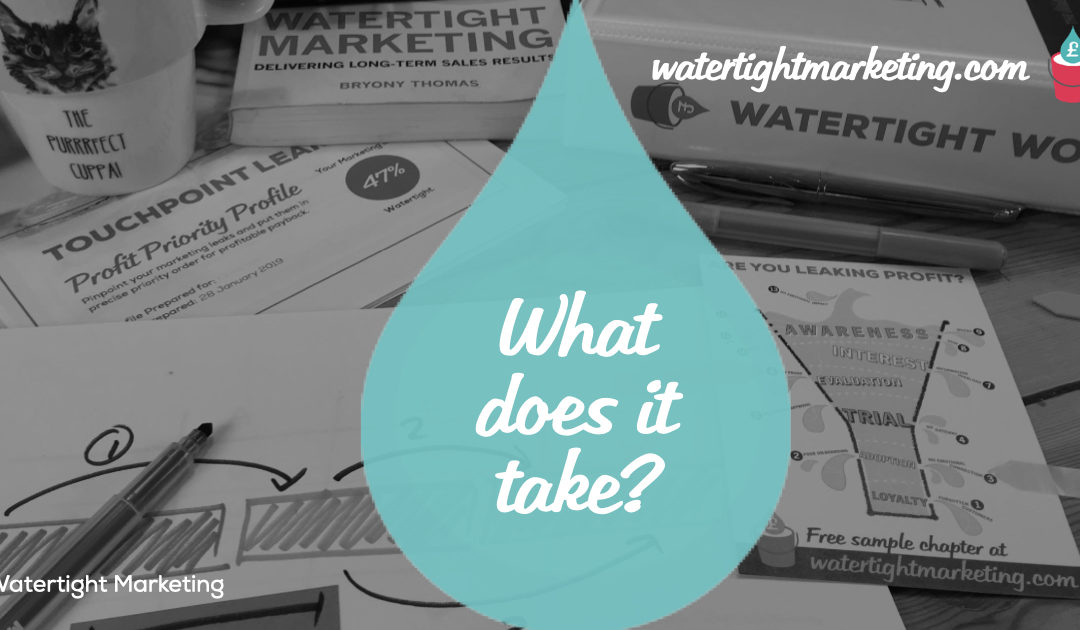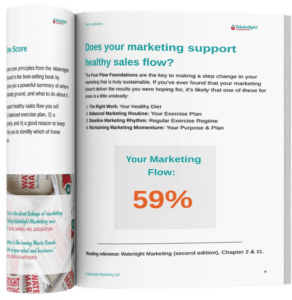Reading Time: 4 Minutes
A number of our clients have invested in young talent to cover their marketing, and want to be able to nurture them into more senior roles. We often find that a business has a marketing manager in role, and now wants them to step into a more strategic directorial role. I asked Master Practitioner, Rachael Wheatley, what is takes to make this leap. ~ Bryony Thomas, Author | Watertight Marketing
Have you been asked to step up from marketing manager to marketing director? Or are you wondering what it takes to progress your career to that next step?
If it’s the first time you will have had a directorial role – and particularly it’s the first time the business has had anyone in that role – it’s not always clear what is expected of you.
So, what does it take to successfully make this step up from marketing manager to marketing director?
Stepping into leadership and managing change
What struck me when writing this article was two things:
- the difference is less about the marketing part of the job as the leadership aspect of the role, and
- that change is a common thread.
Of course, a certain amount of technical expertise is a given. Someone is unlikely to be promoted unless they are already good in their field – in this case, marketing. That’s not to say you need to be a specialist in a particular area, such as digital marketing, data analysis or creative design. You might well have started your career in such an area, or developed a particular specialism along the way in one or more of the many areas that make up marketing. It’s also possible that the business needs someone with particular experience – either functional or sectoral. Overall, though, a marketing director is a generalist role. It needs breadth of knowledge first rather than deep expertise in a particular area.
See: (discussion on breadth versus specialism) When a marketing consultant isn’t a marketing consultant
More than that, it requires the ability and desire to lead the marketing team and operation, to be at the forefront of improving the marketing capability of the whole business. Marketing led well is a proactive function, strategically positioned at the centre of the business, the director being part change-maker and part adviser.
The eight things that will help you step up
1. A clear vision
It may not be there to start with, but within the first 90 days, you’ll want to get your head round the business’s purpose, culture and strategy and how you take that and embed it in your own vision for the marketing team. If the business doesn’t yet have a clear purpose, vision or strategy, then you can be part of helping it to create them. Marketing strategy and plans mean nothing without these.
2. Challenging the status quo
This is a key difference between ‘manager and ‘director’. It is absolutely your remit to challenge what’s happening now and look for change, where it is needed. Marketing has always been at the forefront of change, not least because customers, markets, demands, the world evolve all the time. It helps to have data to inform and guide this challenge and change so that you can back up what you might be proposing in terms of business direction, clients’ needs or perceptions and market changes. This will also mean you will need to have a point of view, so that you can advise.
3. Confidence
Easier said than done, I know. Bravery, boldness and the ability to say ‘no’ are all hallmarks of someone who can take the lead. Not all of us, however, are blessed with this naturally, even if we are completely capable of the role. It helps, therefore, to have an internal champion or ally who knows the company landscape and to whom you can turn to sound out ideas, check your understanding and refine your arguments. Someone who will encourage, support and challenge you, too.
4. A mindset shift
There’s a key mindset shift needed to make the step up to marketing director. You won’t any longer be involved in the doing. That might be very welcome, but for others, who are used to being deeply involved in activities and projects it can be a difficult transition. You are delivering a highly efficient and effective marketing operation through a team, and your job is to equip, enable and empower them to be able to do that and bring out the very best in them. Having a good idea of their skills and motivations is useful here – not least so that you can properly resource the team, and seek external suppliers as needed to both fill gaps and enhance their learning.
5. Mindful self-enquiry
A good marketing director will be reflective and ask themselves questions. How to best serve the customer, how to best serve the business, how does this dovetail with that is expected of them and the team. What do my skills, insight, experience, perspective bring to the business and what might be missing? The answers to these kinds of questions will lead to continual improvement. Even if that seems incremental, it’s being consciously competent that will keep us ahead of the game.
6. Good peer relationships
I’ve always said that marketing is too important to be left to the marketing team. In this regard, you’ll need to develop close working relationships with all other department leads. There isn’t one other function that marketing doesn’t touch. That means making friends and having regular conversations with finance, HR, IT, operations and sales (if a separate department) is crucial. It serves two purposes. Firstly, you’ll be needing help and support from all of these teams at some point. Secondly, it serves to position marketing in a strategic way and as part of a whole (rather than a silo set apart) – at least as important as other functions who historically have taken their seats at the board table earlier than marketing did.
7. A birds-eye perspective
Of course, because of the nature of the job, a director’s perspective is more strategic than that of a marketing manager. There is some overlap, clearly. Where a marketing manager’s time-horizon might start now and look ahead to three years, a marketing director’s spans one year and up to 5 or even 10 years, whilst also seeing sight of how the current year’s activity plan helps to build that longer-term strategy. A director’s perspective has more scope, height and breadth and covers both the internal and external landscapes.
8. Customer-centredness
Marketing has always had the customer at its heart and we often see ourselves as the customers’ champion in the business. It can be a slightly odd position, though, since we are not always in direct contact with customers. If that is the case, then part of the job of the marketing director is to ensure that they, and the team, have contact with, exposure to and a deep understanding of the customers’ point of view, needs and wants. There are a number of ways to effect and embed this customer-centricity. From regular visits with sales people to job swaps with customer services. From setting up customer feedback and regular client reviews to sharing widely and taking action on what comes back.
There’s one final thing that I believe is crucial for a marketing manager to take on to successful step up to being a marketing director. It’s expressed in the Watertight Marketing methodology as Commercial Karma. It encompasses two key ideas. Firstly, that treating people decently is a sound business strategy. Secondly, that helping customers to make the right buying decision, even if that choice is not to buy from you, defines “marketing”. Marketing (much like sales) has had a bad rap over the years. There’s a moral compass here which needs to underpin great marketing, that’s not about tricking, tripping or manipulation. The marketing director is the guardian of that compass.
No-one is the finished article when they get their first marketing director job. More than anything, if you are conscious of the known knowns and known unknowns (to coin a phrase) you can craft your own development plan to make sure that you feel confident taking that step-up, taking the lead and making the change.
With many thanks to business friends on LinkedIn who helped me in researching this topic.
By Rachael Wheatley, Watertight Marketing Master Practitioner

Subscribe to the CMO Toolkit
Would you like to get your hands on the tools, frameworks, templates, workshop packs, slides, and analysis tools we use with our clients? It’s all waiting for you.

Rachael Wheatley
Managing Director, Watertight Thinking
Rachael brings over 30 years’ of marketing experience, with a particular focus on building and developing effective marketing teams that are able to act as a strategic driving force across an organisation. She has worked with Watertight since 2014 as a Master Practitioner and joined the business as MD in 2022.


